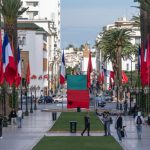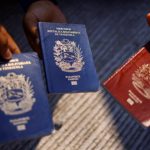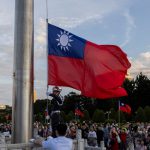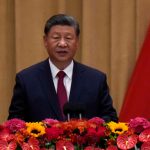
Nguyen Thuy Hanh, a former Vietnamese political prisoner who raised money for families of political dissidents, was released from prison on Oct. 7 after completing a 3 1/2-year sentence.
Hanh participated in many protests against the Chinese government following several clashes between Chinese forces and Vietnam’s coast guard ships and fishing boats in the South China Sea in the early 2010s. She ran as an independent candidate for the National Assembly in 2016.
In 2018, she founded the 50K Fund, a charity that encouraged people in Vietnam and abroad to contribute just 50,000 dong (about US$2) each so that defense lawyers could be hired for people jailed for their political or religious views and to provide support for their families.
She announced the fund’s closure in late 2020. In April 2021, she was arrested on charges of spreading “anti-state propaganda” under Article 117 of Vietnam’s Penal Code, a vaguely worded law that is often used to silence critics.
Radio Free Asia interviewed Hanh last week.
RFA: Welcome back, Ms. Hanh. Could you please tell our readers about your case?
Hanh: The “anti-state propaganda” charge was a false accusation by the authorities. I had done nothing wrong. I was simply exercising my citizen rights.
I was charged with possessing three books. All of the books were objective and had nothing against the government.
I was also charged with giving two interviews. The first was a video I recorded of my speech about the 50K Fund for the Dinh Luong Human Rights Award in 2019 [The 50K Fund won the award but Hanh was unable to attend the presentation ceremony]. The second was an interview with Radio Saigon Dallas.
RFA: Could you provide more details about your trial?
Hanh: Mine was a closed trial. None of my family members or journalists were allowed to attend. However, I felt that this did not affect me because the trial went on as usual, and I didn’t feel any pressure.
As for hiring a lawyer, as everyone knows, like other activists, my trial was a sham with a pre-decided verdict. Everyone knows that lawyers cannot help reduce our sentences or win the case for us. They are mainly there to communicate between the inside and the outside.
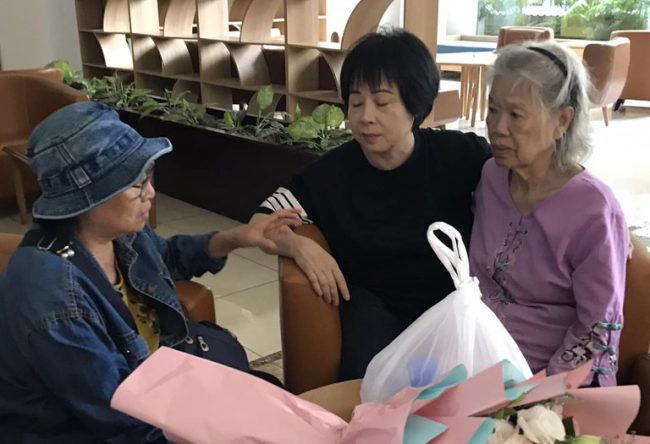
I was told that if I hired a lawyer, the process of working with the lawyer and all the administrative procedures would prolong things even further. So I decided to defend myself in court. I affirm that I wasn’t under any pressure when deciding not to hire a lawyer.
During the trial, they did not grill me. They just asked a few brief and moderate questions. Including the indictment reading, the trial lasted less than 30 minutes.
I did not plead guilty because I had committed no crime. At the trial, I defended myself by explaining that I was not involved in politics, I did not oppose the government, and I did not harm any individual or organization. I spoke up out of a sincere desire for a better and more just society, and all my actions stemmed from my deep love for the country.
RFA: What happened after the trial? How did they carry out your sentence?
Hanh: After being convicted, I was sent to Detention Facility No. 2 and held there for two more months. Before the trial, I had been discharged from a mental hospital, and after that they stopped giving me medication. My condition worsened severely, and I became like someone who had lost their mind. I was no longer thinking clearly.
Because of this, the detention facility took care of me. They assigned staff to stay with me and they also got my medication from the mental health hospital. So I can say that I was not mistreated and was treated like any other prisoner.
I don’t know why, but two days before my sentence was supposed to end, they came to my room at 9 a.m., opened the door, and took me away. They didn’t tell me where we were going or why.
Then they handcuffed me and put me in a prison vehicle. The vehicle had no windows, so I couldn’t tell where we were going. After about an hour, through a small hole in the back of the vehicle, I saw that we were in Ninh Binh province. That’s when I guessed that they were taking me to Prison No. 5 [in Thanh Hoa province].
They put me in a cell with other regular prisoners. During those two days, I was treated well, with no discrimination or mistreatment.
On the day my sentence ended, they woke me up at 5 a.m. to release me, but they didn’t free me at the prison gate. Instead, two female officers took me in a prison vehicle to a bus station. They put me on the bus and didn’t leave until the doors were closed.
In general, they treated me normally. The only problem was that they didn’t inform me or my family where I was going, so my family didn’t know where to pick me up.
RFA: Although the Hanoi People’s Court’s indictment did not mention the 50K Fund, you had to announce its closure several months before your arrest. Could you tell us more about the charity?
I know that [almost] all political dissidents are poor as it’s hard to be wealthy if you live honestly in this society. As many of them are breadwinners, when they are imprisoned, their families lose the main source of financial support. Moreover, their families have to regularly send supplies.
As a result, many families fall into a desperate situation. I wanted to help them, and I used my money to do that. However, I couldn’t help very many prisoners of conscience with my limited resources. Therefore, I created the 50K Fund to mobilize the contributions from friends and residents in Vietnam and abroad.
Fortunately, the 50K Fund generated a lot of contributions. Those who contributed to the fund were of diverse backgrounds. They were retirees, students, and even those who skipped breakfast to save enough VND1 million to contribute to the fund. Some people quit smoking or skipped beer to make contributions to the fund.
It’s noteworthy that before the inception of the fund, Vietnamese people had been afraid of raising funds for political prisoners. The fund raised enough money to regularly provide 3 million Vietnamese dong (US$120) a month to more than 100 families of prisoners of conscience.
The fund’s account at Techcombank was never frozen. When my illness became severe, I was no longer mentally capable of managing the funds and distributing them to people. I also couldn’t find anyone to replace me, so I closed down the fund and spent every last penny, publicly announcing this on Facebook on Nov. 30, 2020.
At my trial, I was not charged for the 50K Fund. One of the reasons for my imprisonment was that I recorded a video of my speech for the ceremony for the Le Dinh Luong Award. That was the only time the 50K Fund was mentioned. Throughout the investigation and trial, and even in the prosecutor’s indictment, the fund wasn’t mentioned.
RFA: Could you please share your plans for the future?
Hanh: Currently, my cancer hasn’t been cured, and my depression, which I thought would get better upon my release from prison, has been so severe over the past few days. I feel very depressed and cannot think clearly about anything. Therefore, I must pay all my attention to treating these two health issues.
Translated by Anna Vu. Edited by Matt Reed.
By:VOA



